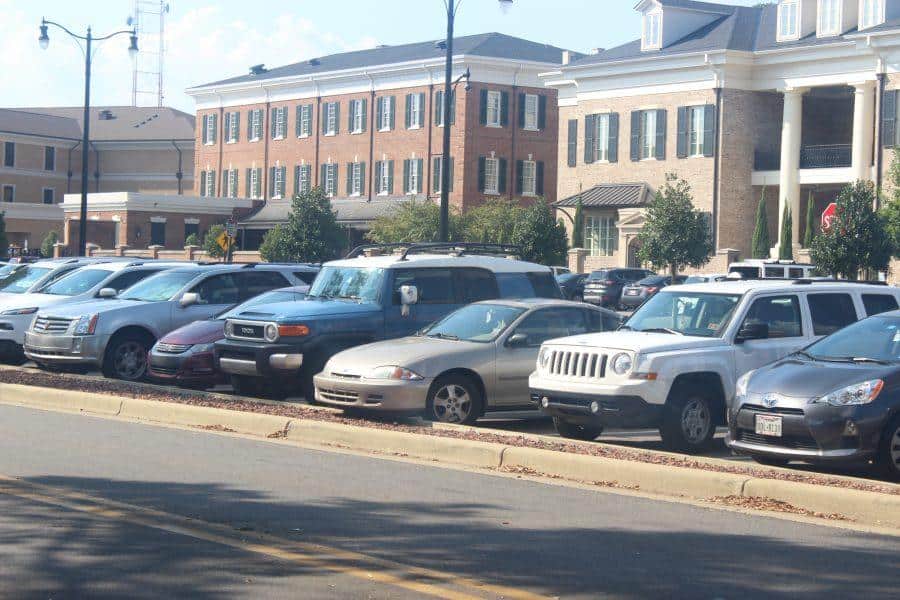Parking on campus is something students and faculty members do daily, whether they are commuting to school from home or simply parking to get a drink at Starbucks. A task that can seem so ordinary, can be anything but for many people’s wallets. Parking at The University of Alabama seems expensive and some members of the community wonder why that is and if it is worth it.
There are five different parking permits that students can purchase. They range from $75 for a motorcycle permit to $630 for a reserve permit, which allows holders to park in all commuter zones and perimeter zones. There are also perimeter, commuter and residential permits which have stricter zone enforcement.
For Stephanie Jordan, a sophomore majoring in advertising, the price of reserve permits seems astronomical.
“I think it’s absolutely ridiculous that they even have a reserve parking permit available because that is just way too much to be spending on a parking space,” Jordan said.
The price of a parking permit is determined by historical averages and anticipated expenses, the parking and transportation committee then reviews the proposed budget, and either denies or approves it. If it’s denied, the parking and transportation committee is back to square one. If the committee approves it, the budget then goes to the administration and official prices for permits will be set.
Chris D’Esposito, director of Transportation Services, said the price of permits will continue to increase due to the need for more parking on campus.
“The price of a permit depends on where you park,” D’Esposito said. “For students that have a perimeter permit, they’re going to have a reduced rate because they’re parking further from campus. It wouldn’t be fair to price all the permits the same.”
This news is upsetting to students like Jordan who feel passes are already more expensive than they should be. Jordan paid $325 for a commuter permit and parks at Coleman Coliseum every day. This is quite a hike from the center of campus.
“I think the price of parking permits should go down because it doesn’t make sense to be paying so much money when I’m not even able to walk back and forth from my car in between classes,” Jordan said. “Once I’m on campus I usually don’t leave until I’m done for the day and I wish that wasn’t the case.”
The parking service on campus is self-sustained, which means that it is entirely independent from the University and receives no state funding. Covering expenses comes from parking permits, citation revenue, visitors paying to park and visitor parking permits. Expenses include upkeep of road ways, parking lots, zone signage, Crimson Ride buses and 348-RIDE.
“Any extra revenue that parking services has goes towards emergency repairs,” D’Esposito said. “Expenses also covers any debt from building or expanding parking structures, which is about 50 to 60 percent of the revenue.”
Courtney Haynie, a sophomore majoring in nursing, has been parking on campus since the summer before her freshman year.
“I’ve noticed some great improvements that have been made over the past two years,” Haynie said. “The expansion of the northeast campus lot has really made my commute to and from school easier.”
One project that the transportation and parking committee has approved is to change the monetary gate system for parking decks. Currently, students and visitors pay $5 to enter parking decks, whether they will be parked for an hour or a day. The committee has decided to change this system so that it costs $1 for every hour someone is parked in the deck, benefiting students who want cheap options for quick parking, but making it more expensive for students who park in those decks for longer, extended periods of time.
That new system would still accept Bama cash as the form of payment, but they could also take credit and debit cards.
There are plans to expand parking on campus, as well. Construction has begun on the residential parking deck for Tutwiler Hall that was approved last year. The next plan is to build a parking deck near Moody Music Building. The so-called “Capstone Deck” will provide commuter, reserve and faculty parking. The project is still awaiting approval by the Board of Trustees.
“I don’t really mind paying for a parking permit,” Haynie said. “I see the improvements that are happening all around, so I think it’s well worth it.”
For those who cannot afford a parking permit, D’Esposito said it’s important to remember the hours of zone enforcement. On weekdays, from 7 a.m. to 6 p.m., a permit is needed to park on campus.
“If you come after those hours, you don’t need a permit,” D’Esposito said. “All we ask is that you’re legally parked. If a student is illegally parked, then that’s when they receive tickets after zone enforcement hours.”
For more information about prices of parking permits, parking maps and general information, readers are encouraged to visit bamaparking.ua.edu.









